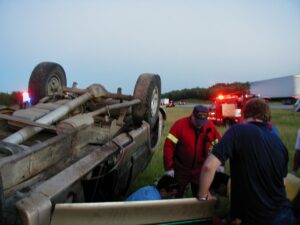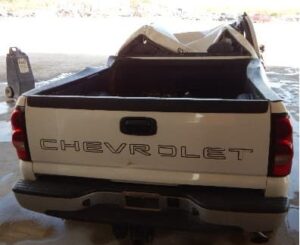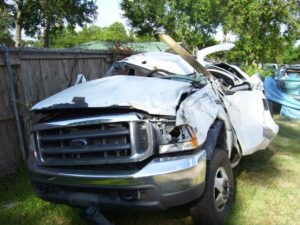Rollover Accident
The number of rollover accidents that occur in the United States each year can vary, and it’s influenced by various factors such as vehicle types, speed, driver experience, loads, road conditions, driver behavior, and other safety measures.
- Percentage of Total of Truck and Car Rollover Crashes: a rollover accident typically represent a minority of all motor vehicle accidents in the United States, accounting for approximately 2% of all crashes, according to data from the National Highway Traffic Safety Administration (NHTSA).
- Rollover Fatalities: Despite their relatively low occurrence rate, rollover accidents tend to result in a disproportionately high number of fatalities. Rollovers have accounted for a significant portion of all traffic-related fatalities in the country.
- Vehicle Type: The risk of rollovers varies by vehicle type, with SUVs, pickup trucks, and vans having a higher propensity for rollovers due to their higher center of gravity compared to passenger cars.
- Prevention Measures: Vehicle manufacturers have implemented safety features such as electronic stability control (ESC) also called by many a black box, that help to reduce the risk of rollovers. The use of these rollover computers or ESC has no doubt contributed to a decline in rollover incidents and saved lives.
Common Causes of a Rollover Accident
Rollover crashes involving pickup trucks, Vans, and SUVs (Sports Utility Vehicles) can be particularly dangerous due to the higher center of gravity of these vehicles compared to passenger cars. Common causes of rollover accidents for vans, SUVs and pickup trucks include:
- Overcorrection: When drivers swerve abruptly to avoid an obstacle, animal or other road hazard and veers off the road and then overcorrect their steering, it can lead to a rollover.
- Tripping Hazards: If an SUV or truck strikes an object on the road, such as a curb, grass in median, guardrail, or a pothole, it can act as a “tripping” hazard, causing the vehicle to tip and rollover. A tripped rollover can cause loss of control, especially to SUV & Pickup trucks. Tripped rollovers occur due to the momentum and the vehicle’s center of gravity causes rollovers to occur and total lost control of steering and braking.
- Tire Blowout Rollovers: A sudden tire blowout, or tread separation at highway speeds particularly on one of the rear wheels, can cause a driver to lose control, leading to a rollover if the driver is unable to regain control. When a tire tread failure or blowout occurs on the front tire, the driver has a greater ability to steer the vehicle to safety.
- Vehicle Overloading: Carrying heavy cargo in the rear cargo area or the truck’s bed or overloading the vehicle’s roof can quickly raise the center of gravity, making the vehicle more prone to tipping over during evasive maneuvers or sudden stops.
- Distracted or Impaired Driving: Any form of impaired or distracted driving, such as texting, talking on the cell phone, alcohol or drug impairment, or fatigue, can decrease a driver’s ability to respond to changing road conditions and increase the risk of rollovers.
- Lack of Electronic Stability Control (ESC): Older SUVs and trucks without electronic stability control systems are more susceptible to rollovers as they lack the technology to assist in maintaining stability during abrupt maneuvers. ESC helps to regain control of the vehicle, apply brakes, and even help in steering the vehicle back to safety.
Rollover Accident Injuries
A Rollover accident can result in a wide range of injuries, some of which can be very severe or even fatal due to the forces involved in the rollover and the potential for the vehicle’s roof, roof pillars, supports, or sides to collapse. The major types of injuries in rollover car accident scenarios include:
- Traumatic Brain Injuries (TBIs): These injuries occur when the head is struck during the rollover, it can lead to brain damage. TBIs can range from concussions to severe, life-altering brain injuries. Traumatic brain injury from a rollover car accident can be a life-altering injury.
- Spinal Cord Injuries Due to a Rollover: A rollover can cause severe spinal cord damage to the spinal cord. This spinal damage can lead to paralysis or loss of sensation in various parts of the body. In vehicle rollover accidents involving in which the car rolls over and the occupant is ejected, impacts the roof and pillars in the vehicle, especially at highway speeds, paraplegia and quadriplegia (tetraplegia) are common injuries.
In rollovers of trucks and passenger vehicles bursting fractures from vertical compression to the spinal cord can occur. Bursting fractures are rare but can lead to the occupant usually the person being a paraplegic from the rollover accident. - Fractures and Broken Bones: Rollover accidents often result in fractures and broken bones, such as fractures of the arms, legs, and pelvis, and even traumatic amputations from partial ejections.
- Head and Facial Injuries: The head and face are vulnerable to impact with the vehicle’s interior, the ground, or other objects during a rollover, leading to injuries such as skull fractures, facial lacerations, and jaw injuries. If the upper body and head are trapped by the crushing roof, suffocation or positional asphyxia can occur
- Lacerations and Abrasions: Sharp objects, shattered glass, and debris inside the vehicle can cause cuts, lacerations, and abrasions on the skin, leading to infection risk.
- Burns: In rollover accidents where fuel fed fires or gas tank explosions occur, occupants may suffer burns, which can range from mild to severe, depending on the circumstances. In some rollovers, the gas tank can be ruptured resulting in severe injuries, burns and other life threatening injuries and rollover fatalities
- Emotional and Psychological Trauma: Rollover accidents can be traumatic experiences, leading to mental anguish, disfiguring scars, psychological injuries such as post-traumatic stress disorder (PTSD), anxiety, and depression.
- Fatal Injuries: Sadly, a high number of rollover crashes result in fatalities, particularly when occupants are unbelted and ejected from the vehicle or suffer severe head or chest trauma. The higher the speeds of the rollover crash, the higher the energy forces and damage to the human bodies inside the vehicle.
/The severity of these rollover types of injuries can vary widely depending on factors such as the speed of the rollover, the type of vehicle involved, the height and weight of the occupant, whether seatbelts were used, whether airbags deployed correctly, whether it is a single vehicle rollover, whether it was a trip rollover. In years past, many were left injured due to faulty seat belt buckles, door locks and door latches holding in the rollover.
Filing a Rollover Accident Lawsuit Against the Vehicle Manufacturer
Filing a product liability case due to a rollover car accident, roof crush or rollover crash of a pickup, SUV or van typically involves investigating the facts of the accident, hiring experts and determining whether if a defective product or component of the vehicle contributed to the rollover. The potential parties at fault in such cases may include:
- Automaker/Manufacturer: The vehicle’s manufacturer may be held responsible if a defect in the design, manufacturing, or testing of the vehicle contributed to rollover car accidents or rollover crashes rollover. This could involve issues such as a flawed roof structure, seat belts, lack of padding, door locks opening or a defective suspension system. Defective steering systems can cause lost control, especially on narrower vehicles.
- Tire Manufacturer: If the vehicle rollover was caused by a tire blowout or tire tread separation, the tire manufacturer could be liable if the tires were found to be defectively designed or manufactured. In some cases the tire dealer or repair shop or inspection station may be found at fault or negligent in failing to inform the owner of worn-out or bad tires.
- Parts Manufacturers: If a specific component or part of the vehicle was defective and directly contributed to the rollover, the manufacturer of that component may be held responsible. This can include components like airbags, brakes, steering systems, door latches or seatbelts. If a seat belt fails to hold the occupant and they are ejected from the vehicle, then liability may attach
- Retailer or Dealership: In some cases, the retailer or car dealership that sold the vehicle or its components may be liable if they knew or should have known about the defect and failed to take appropriate action, especially on vehicles sold used. Many times used vehicles have outstanding recalls and are sold without fixing the recalled part or problem.
Corporate and Government Entities: If rollovers or car accidents were caused by poor road conditions, road construction, inadequate signage, uneven pavement, or other factors related to road maintenance or design, government entities, and road repair contractors may be responsible for the road may be held liable
Damages Compensation in a Rollover Lawsuit
In many rollovers, an injured occupant may be able to recover various types of monetary damages, both economic and non-economic, through a personal injury claim or lawsuit. Whether the accident was a single-vehicle rollover or not, the injured occupant needs to seek out experienced personal injury lawyers to investigate the case. The damages that can be recovered can vary depending on the circumstances of the accident, the severity of the injuries, the percentage of occupant or driver negligence, speed or vehicle and the applicable laws in the jurisdiction.
Here are the types of damages that an injured victim may be able to recover:
- Medical Expenses: This includes all reasonable and necessary medical costs related to the treatment and recovery of injuries, such as hospital bills, surgery costs, doctor’s visits, prescription medications, physical therapy, and rehabilitation.
- Lost Wages: Victims can seek compensation for income lost due to their injuries, including missed work days, reduced earning capacity, and potential future lost wages if the injuries result in a long-term disability.
- Pain and Suffering: Non-economic damages, such as physical pain, emotional distress, and mental anguish, can also be compensated. These damages are more challenging to quantify and often require expert testimony to establish their value.
- Property Damage: The cost of repairing or replacing a damaged vehicle or other personal property as a result of the rollover accident can be included in the claim.
- Disability and Impairment: If the rollover accident results in a permanent disability or impairment, victims may be entitled to compensation for the long-term consequences of their injuries, including ongoing medical expenses and loss of enjoyment of life.
- Loss of Consortium: This type of compensation is for the loss of companionship, support, and services that a spouse or family member experiences due to the victim’s injuries.
- Wrongful Death: In cases where a rollover accident leads to a fatality, surviving family members may be eligible to seek damages through a wrongful death claim. This can include compensation for funeral and burial expenses, loss of financial support, and emotional suffering.
- Punitive Damages: In rare cases where the defendant’s conduct is found to be grossly negligent, willful, or intentionally harmful, punitive damages may be awarded. Punitive damages are intended to punish the defendant and deter similar behavior.
It’s important to note that the availability and calculation of damages can vary by state and depend on the specific circumstances of the case. Consulting with an experienced personal injury attorney is crucial to understanding your rights and pursuing the full compensation you deserve.
While most people understand that different states have different filing timelines or statutes of limitations, many do not know about the time deadlines imposed in some states under the Statute of Repose, which limits the amount of time a person can sue the product maker from the date the product was first manufactured and sold. It is extremely important, to consult a product liability or personal injury attorney to be sure no deadlines run or expire
An attorney can assess the details of your rollover accident case, gather evidence, hire the needed engineers and experts, preserve the evidence, calculate damages, negotiate with insurance companies and automakers, and, if necessary file a lawsuit, represent you in court to secure money damages for you losses and injuries.
Talk to a Rollover Accident Lawyer
A rollover accident lawyer is a personal injury attorney who specializes in handling complex product liability cases related to rollover accidents against the maker of the vehicle, tire maker, the driver and their insurance company for injury compensation due the victims . Rollover accidents are a specific type of motor vehicle accident lawsuit in which a vehicle overturns or rolls onto its side or roof during a collision, single-vehicle rollovers on road or off road onto the shoulder or median or while driving. These accidents can result in serious injuries and deaths, and victims, families and spouses often seek legal representation to pursue compensation for their damages.
The role of a rollover accident lawyer includes:
- Initial Rollover Case Assessment: Evaluating the circumstances of the rollover accident, gathering evidence, securing the vehicle, tires and other evidence, and determining liability. This includes examining factors such as driver behavior, road conditions, and potential defects in the vehicle’s design or maintenance.
- Client Consultation: Meeting with the accident victim or their family over the phone, by zoom or n person to discuss the case, explain legal options, and guide how to proceed in the case.
- Evidence Gathering: Collecting and preserving evidence related to the accident, including accident reports, tires, treads, vehicles, witness statements, photographs, and expert opinions. This evidence is crucial in establishing liability and damages. If the evidence is not preserved, then the product liability case may be impossible to prove.
- Determining Damages: Assessing the full extent of the victim’s injuries and damages, including medical bills, lost wages, pain and suffering, mental anguish, disfigurement, and other losses. This involves working with medical experts, life care planners, and economists to understand the long-term costs and impact of injuries.
- Litigation: If a fair settlement cannot be reached through negotiations, the lawyer may file a lawsuit on behalf of the victim and represent them in court. This includes filing legal documents, conducting discovery, and presenting the case before a judge and jury.
- Advocacy: The trial lawyer must serve as the advocate for the accident victim’s rights and interests throughout the legal process. The lawyer’s role is to ensure that the victim receives fair compensation for their injuries and losses. All cases and amount of recoveries require the client’s approval before settlement.
- Legal Expertise: The rollover accident attorney provides the legal advice and guidance to the client, explaining their rights, options, and the potential outcomes of their case.
- Client Communication: Answering client’s questions, returning phone calls and keeping the client informed about the progress of the case, responding to their questions and concerns, and maintaining open and transparent communication throughout the legal proceedings. At the Willis Law Firm we do exactly that.
- Settlement Evaluation: All rollover accident cases and lawsuits require a careful assessment of any settlement offers made by the opposing party to ensure they adequately compensate the victim for their injuries and losses. When such significant settlement offers are made, attorney-client calls are made to discuss.
An experienced rollover accident lawyer has years of experience and expertise in personal injury law and especially in complex product liability litigation as it relates to single vehicle accidents and rollovers, tire defects and failures, roof collapse, and roof crush injuries. a rollover lawyer is hired to protect the legal rights of accident victims and pursue compensation to help them recover from their injuries and financial losses.
If you have been involved in a rollover accident and believe the automaker, tire manufacturer or someone else’s negligence contributed to the crash and injuries, you need to consult with an experienced rollover accident lawyer can be crucial in pursuing a legal compensation claim.
Call 24/7 and speak to a Lawyer Today at 1-800-883-9858



